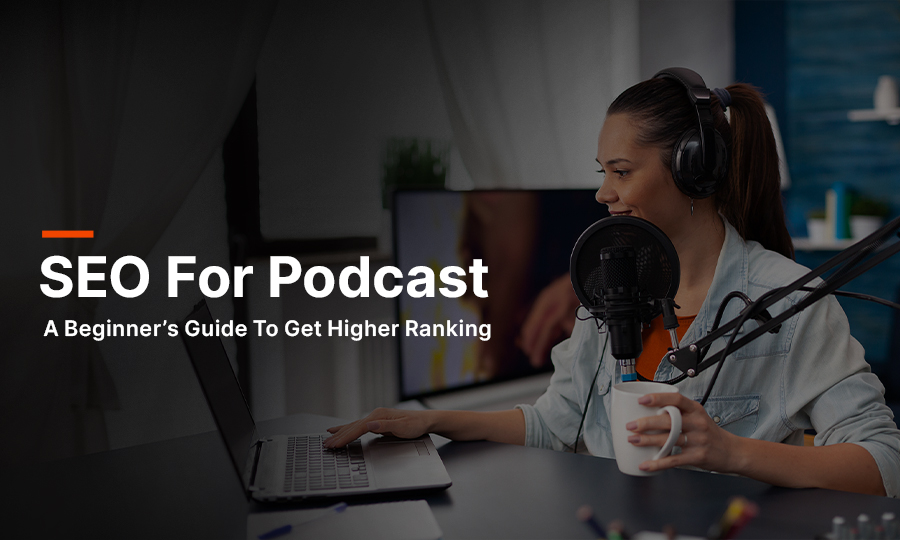SEO is the stepping stone that can cast a limelight over your podcast content. You might have some superb podcasting ideas up your sleeves, but for your career to take flight, you need more listeners. This is exactly where SEO for podcast can assist you. It attracts more organic traffic to a website with the help of higher rankings on the search results.
Podcast SEO includes leveraging various techniques like keyword research, obtaining RSS feed links, structuring the website, transcribing, crafting show notes, & more. However, this is not enough. You also need some patience to get the desired volume of organic traffic.
It is estimated that by 2024 there would be 504.9 million podcast listeners globally. With the help of SEO, you can channel listeners to your website. Even if you can garner the attention of a fraction of one percent of the entire global podcast listeners, your earnings will be in millions! Hence, trying is worth the effort.
Read the complete guide to know how you can optimize your podcast site and get more online audience for your content.
What is SEO for Podcast?
Podcast SEO refers to efforts that help podcast episodes rank on search engines for specific search terms. It includes leveraging various search engine optimization processes like keyword research, obtaining feed links, structuring the website, transcribing, and optimizing show notes.
With the help of SEO, the online visibility of podcast episodes increases. Hence, when prospective listeners search with your target keywords, content from a well optimized website ranks on top.
Benefits of Podcast SEO
The simple answer to this question is ‘to succeed as a podcaster!’
A study by YouGov in 47 countries reveals that the average podcast listener spends about an hour listening to podcasts. While the top 10% of podcast lovers remain glued to podcasts for more than 10 hours a week!
You have to take advantage of these numbers to establish yourself as one of the most popular podcasters. To do that, you require SEO on your way up to the peak of success.
However, we shall delve into a little detail and get to know the various ways in which SEO can help you gain more listeners;
- Targeted Traffic: SEO helps you to target traffic through geo targeting features.You can target the demographic cohort where you can find the maximum potential listeners.
- Better UX: SEO practices programs websites for a better user experience by offering faster loading speed, easy navigation, mobile compatibility, and more.
- Competitive Advantage: Backing up your podcast website with SEO best practices helps you gain advantages over your fellow competitors in capturing listener base.
- Monetization Opportunity: You can create an earning opportunity by enabling ads on your website. A high ranking website can earn a lot more from Google adsense account for which podcast can assist you.
11 SEO for Podcast Strategies to Increase the Listenership Base
Podcast SEO is important if you want to increase the number of listeners to your content. Thankfully, the strategies are not hard. With a little patience, you can master SEO.
We have done intensive market research in the podcasting avenue and found out the best SEO techniques that have worked for some of the top podcasters globally.
Without further ado, let’s get to the eleven important strategies on SEO for podcast.
- Research Keywords to Rank Podcasts
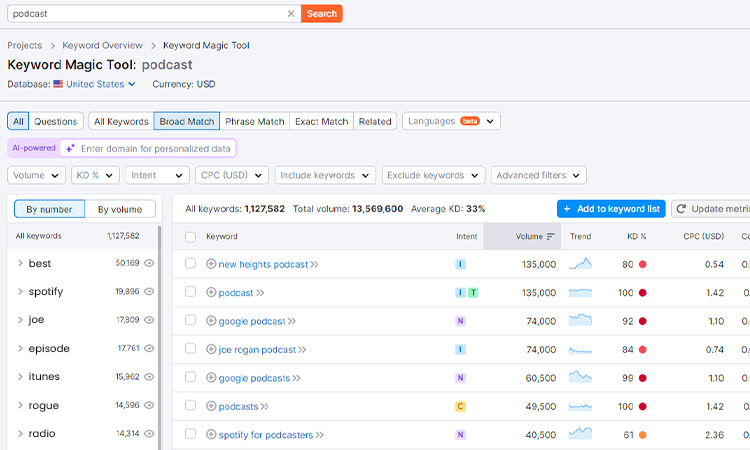
Keyword research for podcasts is the practice of finding out the most searched terms by users and targeting the same in the podcast content.
As SEO practice is primarily dependent on keywords, this step is fundamental to the practice. Hence, conduct thorough keyword research to help your website rank.
Conducting relevant search term research for every episode is vital as each one is different from the other. And people are unlikely to search for one episode with the same keyword as the previous one.
To rank your podcast website, use keywords that are relevant to the episodes. But it does not end there. There is no use of a keyword that is relevant, and yet no one is looking for it.
Conduct keyword research using SEO tools like Google Keyword Planner, SEMrush, etc. These tools help you find relevant keywords that people are actually searching for. A good understanding of keyword opportunities has helped get you the upper hand in the search rankings. A keyword opportunity is basically finding keywords with high search volume and low
There are two types of keywords for podcasts— ‘head keywords’ and ‘long tail keywords‘. The former is shorter and targets a broader audience. The latter however, is longer and shows up on relevant search queries.
Incorporating a strategic combination of broad keywords, long tail keywords, and LSI on your podcast website, Podcast titles, meta descriptions and show notes should fetch you the desirable results!
You can learn here how to do effective SEO keyword research by avoiding common mistakes that many make.
Tips on keyword Research for Podcast:
- Leverage keyword research tools
- Target both broad and long tail keywords
- Find keywords with high search volume and low difficulty
- Apply relevant keywords to optimize each podcast episode
- Monitor keyword placement in website content
- Optimizing Episode Titles Brings New Listeners
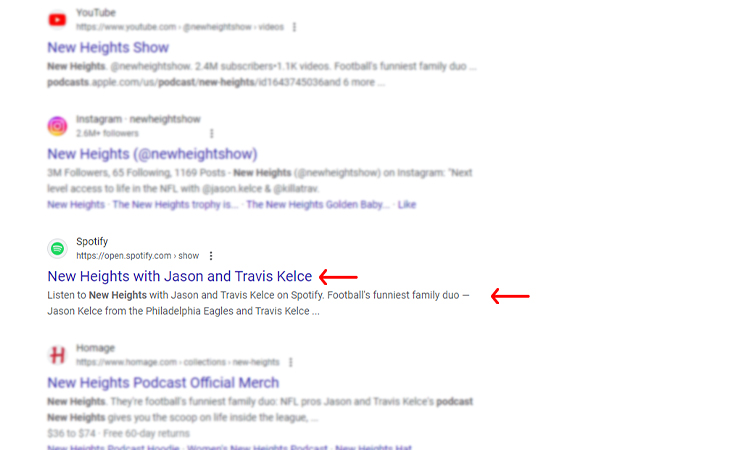
Podcast titles are your perfect opportunity to convey the main topic of the podcast to your listeners. Try keeping the episode titles a bit lengthy to give a better idea about what the podcast is about.
Lengthy titles also make it easier for you to incorporate the target keyword into it, making it easier for the search engines to discover the content.
Suppose you have a guest on your show. In this case, always mention their name in the podcast title and infuse the main keyword.
Now, if you are inviting a person on your podcast, chances are she or she is a famous person with a fan base.
Including your guest’s name in the episode title attracts new listeners along with your existing listeners, giving your podcast episode a 2X broader audience who are interested in the podcast content of the new episode.
If this seems overwhelming at this point, you can gradually build your podcast SEO strategy, one step at a time!
How to Optimize Podcast Titles?
- Include the main keyword in the title
- Don’t be afraid to keep it controversial
- Add the name of the guest (if any) to the podcast title
- The title should be clear & concise
- Aim to keep the title lengthy (but not too much)
- Podcast Episode Descriptions are an Absolute Must
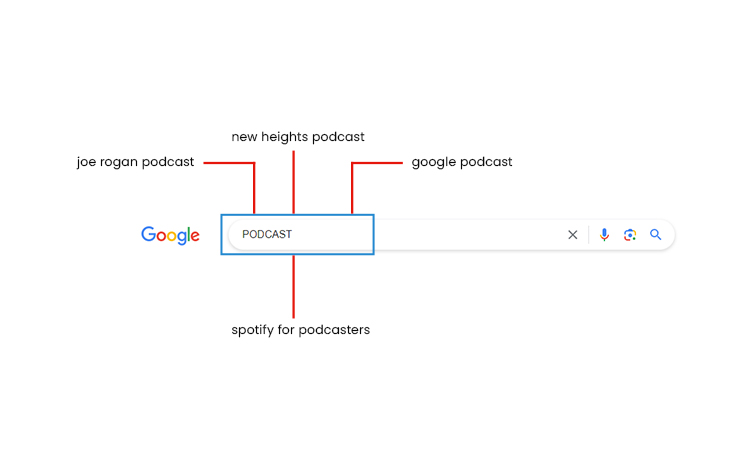
Episode description for a podcast is the perfect opportunity for you to give a synopsis of the content to potential listeners.
Time is precious for everyone. Hence, your potential listeners might want to know what is special about your podcast.
They just want to confirm that the podcast is worth their time before investing 20 minutes or half an hour of their day.
You have to be patient here. Try writing the best episode description you can, as it is an important parameter by which search engines analyze your SEO for podcasts.
Use the target keyword, LSI and relevant terms in the podcast description. It piques the interest of the audience and increases the chances of search engine discoverability at the same time.
The ideal description length for an episode is 50 to 150 words. Anything longer than that, and you might bore the audience. Shorter episode descriptions, on the other hand, are not descriptive enough to evoke the interest of your target audience.
The trick is to stay relevant to the podcast content and pen down the most interesting aspects in the episode description. If you want some assistance, you can always build an in-house team that takes care of the written content or contact a content marketing company.
How Podcast Description Amps Up SEO?
- Descriptions are a good place to include keywords and LSI
- It adds content to your website
- Offers a synopsis to boost the click through rate
- Piqued audience interest adds positively to on-page behavior
- Transcribe Each Podcast
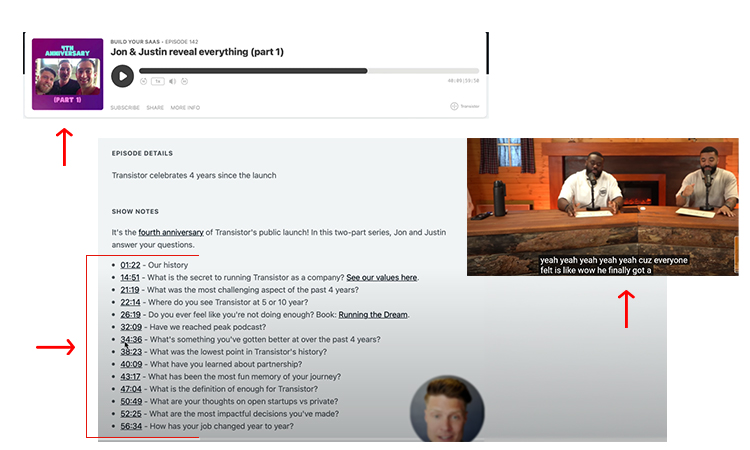
A transcription is the verbatim written account of the podcast. There are two major ways to transcribe your podcast— verbatim style or with timestamps.
A verbatim-style podcast reads like a script. In this type of podcast transcription, the words are written against their names. Although these types of transcriptions are entertaining to read, they offer little information on the timeline.
A podcast with timestamps on the other hand has word-to-word written against a timeline. It offers timecodes to give an in-depth knowledge to the audience regarding when the words were spoken during the podcast.
Transcribing podcasts offers you the chance to upload loads of written content on Google, which the search engine loves.
Not just that, transcription gives you control over the translation. As a transcription is the verbatim account of the podcast, it automatically includes the important keywords, terminology and highlights crucial aspects of the show on the search results.
Podcast transcription is also important for inclusivity.
A well documented account makes the show content available for persons with hearing disability. Transcriptions are as entertaining as the podcast is. As it reads like a book, deaf people can enjoy them at their leisure.
Benefits of Transcribing Podcast
- More content for the search engine
- Easier to infuse written keywords for better ranking
- Assists search engines understand your content and place it higher on SERPs
- Show Notes Make Audio Content More Consumable
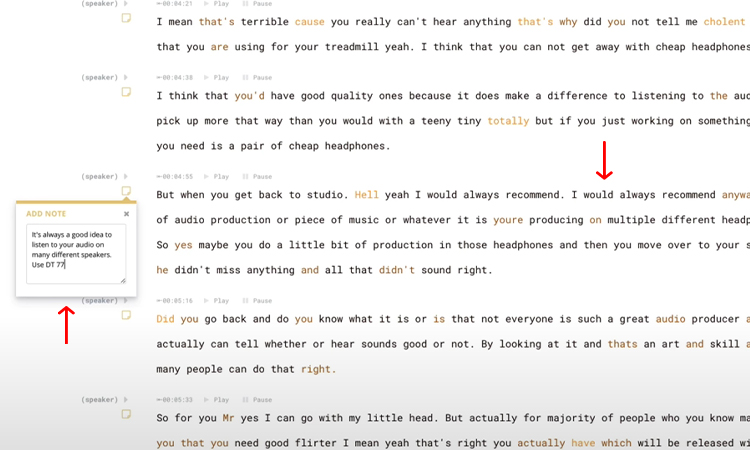
Podcast show notes are short audio descriptions that are posted alongside the audible content.
Show notes are similar to a ‘table of contents’ in a blog. It highlights the important aspect of the content and is a vital aspect while optimizing SEO for podcast.
To get more audience to tune in, start your show note with a brief summary of the podcast. Highlight the most interesting topics on your podcast here. A little mystery or suspense always helps.
Incorporating Guest bios is important here as it will increase the listener base of the content.
Link to any tools, quotes, or videos that you might have mentioned in the podcast. This helps visitors verify the sources and strengthens the EEAT signal, which in turn is an important factor for ranking on the search results.
Including timestamps helps the potential listeners who are short of time, or they might just be here to listen to the parts they like. The show notes have to be crisp and concise.
Unlike transcribing, which is a word-to-word account of the podcast, show notes require some creativity and SEO insights to rank better. If you have a little spare budget, consider taking the help of a content marketing agency.
Do not forget to finish your show notes with a call to action as your primary motto is to get more listenership. Hence, incorporating a compelling call to action is a crucial aspect here.
Benefits of Show Notes
- Helps listeners learn more
- Easier to incorporate keywords
- Gets more people to tune in
- Highlights the important parts of the show
- Pay Attention Website Structure for Podcast Rankings
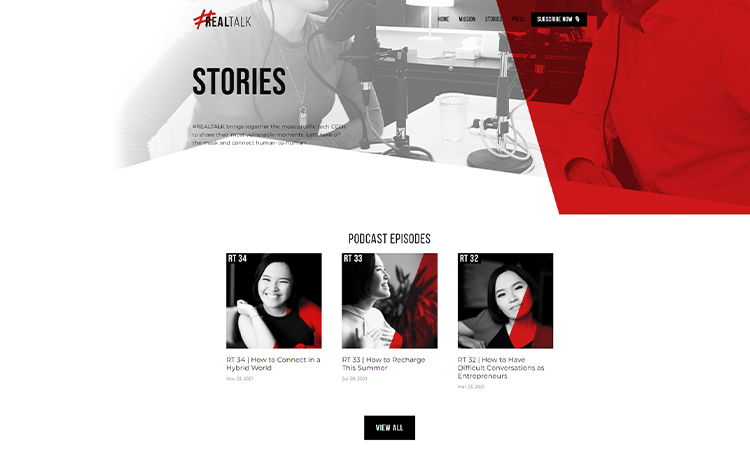
You would need a website to optimize SEO for podcasts.
The process is simple. Buy a domain (preferably with a name that is related to podcast, or audio content), get a hosting and design your website.
You can start uploading content related to podcasts on your website. This allows search engines to deliver more information to potential listeners.
However, pasting the RSS link on the website is not the end of your SEO efforts. In fact, it is just the beginning!
To optimize SEO for podcasts, you must categorize these audio content in niches. Segmentize these according to topics or genres. Create a separate list like ‘Top Charting,’ ‘Most Played,’ “Most Liked,’ “Most Recent,’ etc.
Structuring your website helps visitors find podcasts through easy navigation.
Suppose someone came to your website without knowing what they’d like to listen to. Creating a sane website structure will help podcast audiences like them find what they want.
Creating a website empowers you with the ability to create blogs on your podcast episodes. This will not only render the potential listeners with more information on your content, but chances are Google will also pick up information and rank both the podcast and the web content higher on the search engine results pages.
Tips for Creating Website for Podcasts
- The domain name should be related to podcasting or something catchy
- The domain should preferably be old
- Design a website so that content looks structured
- A Blog Section is a High-Value Avenue
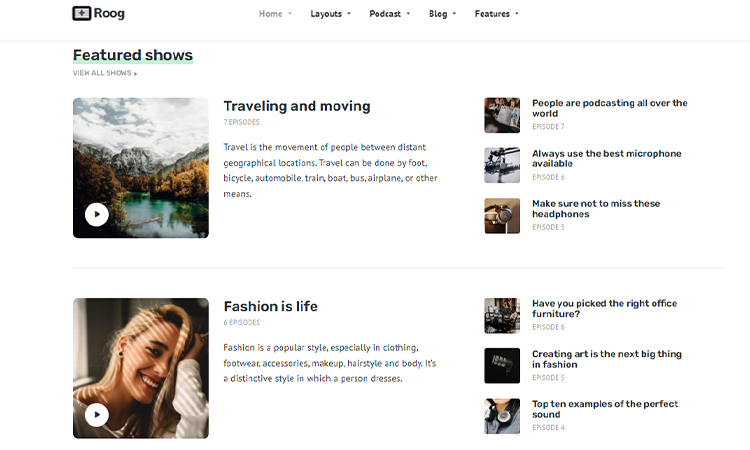
If you aim to boost listenership through more visitors on your podcast website, starting a blog section is a good domain to explore.
A blog section is a high-value avenue as it gives you the chance to target important keywords that you might not be able to do using the transcription and show notes from the podcast. Not only that, it also allows you to bolster the written content section of your website.
This is particularly important if you are not using transcriptions to bolster podcast SEO.
With the help of a blog section, you can engage readers on varied topics that your podcast does not cover yet. Another great way of using the blog section is to write down your podcast in the form of a story.
Visitors who prefer to read instead of listening can take up to the blog section instead of listening. Hence, a blog section for podcasts does not only increase the organic traffic to your website but also contributes to increasing the fan-base of your content, written or in the form of audios!
Tips for Creating a Blog Section for Podcast Website
- Target podcast niche-related keywords for blogs
- Check the readability factor
- Keep it entertaining
- Add a variety of blog topics to the section
- Publish a few times a month
- Update existing blogs for better search ranking
- Submit Podcasts to Directories
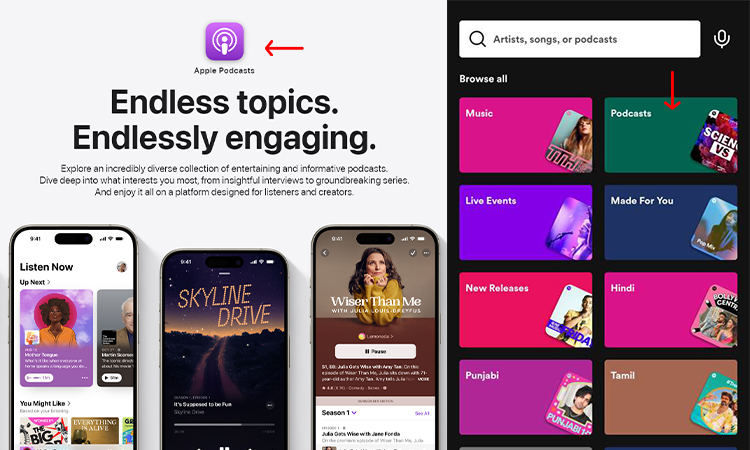
Limiting your podcast only to YouTube is underutilizing its potential. Instead, submit your audio content to Podcast directories to get the maximum number of listeners.
First, you have to get a good podcast platform for hosting the content. Once you get the platform feed URL, copy and paste it on podcast directories like Google Podcasts, Apple Podcast, Spotify, etc.
Yes, you can upload a single podcast in more than one directory without any issues. This helps you to capture the market and etch a mark on the heart of the podcast listeners.
Mentions, reviews and social shares of your podcast’s link won’t evade Google’s eyes. Google’s algorithm picks up these instances, and ranks Podcasts on the top of the search results.
7 Best Podcast Platforms
- Google Podcasts
- Apple Podcast
- Audible
- Amazon Music
- Tuneln
- Pandora
- Bolster Presence on Social Media Channels

Social media optimization and SEO are indirectly connected. One influences the other.
If you leverage cross promotion on social media, it can lead to thousands of social shares. This is great from more than one perspective.
First, not only is your content being consumed more, but these shares also offer natural links to your domain, which increases its authority.
Currently, over half the global population is on social media. Around 62.6 percent of the world’s population were social media users, making it a tremendously powerful channel for marketing.
Social media optimization is one of the best SEO strategies for podcasters. If you can leverage it, there will be no dearth of audience.
To do cross-promotion for podcasts on social media, make a list of social media platforms that you want to use. Create a page on it (avoiding your personal account for promotion). Creating a dedicated page makes it look more professional, attracting more likes and shares. You can also monetize certain social media pages if you want to.
How to do Cross Promotion for Podcasts on Social Media?
- Create a dedicated podcast page on a social media channel
- Upload short content specially dedicated to social media
- Paste the links of the original podcast on social media
- Include relevant hashtags for better audience reach
- Ask for Reviews (Always)!
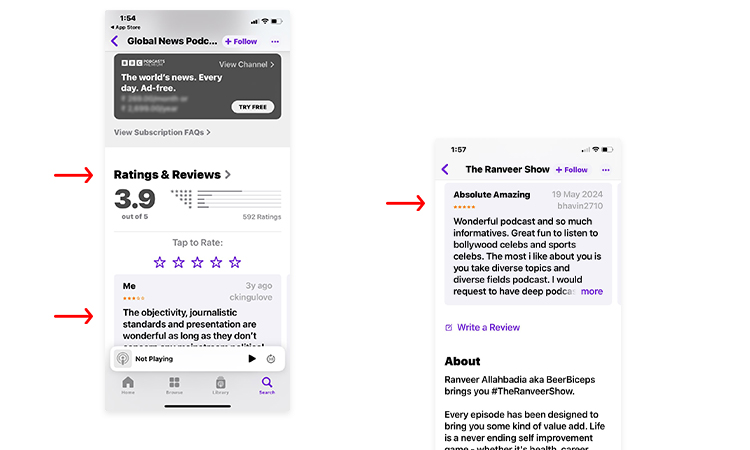
Podcast ratings and reviews play an important part in bolstering the audience base.
You might ask how?
A study by Auddy suggests that 67% of listeners aged between 24 to 34 and 65% podcast listeners between 35 to 44 years of age pay importance to podcast reviews.
Positive podcast ratings and reviews convey to potential readers that the audio content is well worth their time. It will add positively to their experience.
A host of positive reviews also adds to your chances of ranking on Google search results. This is because the search engine considers reviews and ratings as a factor for ranking.
Good reviews convey to the search engines about the positive experience of the existing audience base. Hence it recommends such podcasts to people by ranking them on the organic search results when someone searches with related keywords that the podcast episode has targeted.
How to Increase Positive Reviews for Podcasts?
- Include CTA
- Dedicate automation asking for Google reviews
- Invite feedback and discussions
- Respond to comments
- Don’t Underestimate the Power of PR

As a podcaster, your image should mean the most to you!
Of course, your content needs to have the sharpness of a sword to cut through the competition, but personal image plays an important role, too. Hence, investing in building a PR team that takes care of online reputation management is crucial
For starters, you can start communicating with the social media page visitors in the comment section. You can also develop media relations and be an active member of the podcast community.
While this sounds easy, let us tell you in advance that it will take up quite some time. If you can dedicate your precious moment into building an image or building an in-house PR team for that matter, great! If not, you can connect with any of the pr agency to take a shortcut to better name & fame!
How do we identify Good PR Agency for a Podcaster?
- Consider industry expertise
- See if they have worked with other podcasters
- Look at online reviews and ratings of the PR agency for Podcasters
- Check if they have a specialized team for the purpose
Conclusion
SEO for podcast might look challenging in the first instance, but with a few tactical steps, it becomes easy. Once your website gets enough attention, so does the audio content.
By targeting relevant keywords, dedicating a blog section, providing authentic transcription, and showing notes, you can win the heart of the millions of audience. Also, wire up your website with good technical SEO practices so that it offers the best user experience to the visitors.
As Google’s algorithm changes are unpredictable, keep yourself updated on the recent SEO trends to stay relevant. SEO is not tough to learn. Once you get the hang of it, there’s no stopping you from being one of the most popular podcasters.

